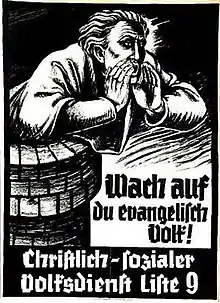Christian Social People's Service Christlich-Sozialer Volksdienst | |
|---|---|
| Founded | December 1929 |
| Dissolved | 1933 |
| Split from | German National People's Party |
| Ideology | Christian democracy Political Protestantism Conservatism |
| Political position | Right-wing |
| Colors | Grey |

The Christian Social People's Service (German: Christlich-Sozialer Volksdienst, abbreviated CSVD) was a Protestant conservative political party in the Weimar Republic.
The party's genesis lay in Adolf Stoecker's Christian Social party, which joined the German National People's party in 1918,[1] and effectively functioned as the parties labor wing.[2] The Christian social Franz Behrens wrote a substantial amount of the DNVP's 1918 platform, however the Christian socials failed to get the DNVP to endorse trade unions over company unions.[3] The ideological differences over labor rights came to a head when Alfred Hugenberg became leader in 1929 and attacked the employment insurance scheme, which encouraged the Christian socials to consider leaving the party.[4] At the time, the Christian socials represented the moderate tendency within the DNVP, as opposed to the radical nationalist leadership of Alfred Hugenberg.[5] These Christian socials formed the Christliche-soziale Reichsvereinigung [Christian-social Imperial Association], and would actively oppose Hugenberg.[6] What eventuated was a combined expulsion and resignation of the Christian socials,[7] and other conservative elements within the party.[8]
The CSVD drew from other political movements, such as the Christlicher Volksdienst (CVD, Christian People's Service), which dated back to 1924, and drew from Pietists and Christian Trade unions.[9][10] Another Protestant party was the EV (Evangelische Volksgemeinschaft), a Hessian party. Centrist party leaders urged the EV to join with the German-Hanoverian Party to found a Protestant peoples party that would form a vote sharing agreement with the Centre Party.[11] The EV would be absorbed by the CVD in 1929,[12] and the Christian Socials/Christian-social Imperial Association would join with the CVD to form the CSVD in December 1929.[7][13]
The CSVD was mainly supported by middle-class elements,[14] however, it did support the Christian trade unions, and was significantly supported by the league of Christian unions.[15] As a result of the theocratic currents in the parties Calvinist regions, the party supported state welfare, trade unions and workers participation in management.[15] Like the Centre party, the CSVD opposed Materialism, Atheism, Liberalism and Marxism. The party would embrace co-operation with the Centre party.[14] The CSVD was a cabinet party in the second, third and fourth Brunings ministries.[16]
The CSVD portrayed itself as a Protestant version of the Catholic Centre and was mainly supported by middle-class elements. The CSVD contested the 1930 and 1932 parliamentary elections; the party CSVD formed a joint parliamentary group with the Christian-National Peasants' and Farmers' Party in the Reichstag. After the Nazi take-over in 1933, the CSVD was dissolved.
The President of the Federal Republic of Germany Gustav Heinemann (1969–74) was a member of CSVD during the Weimar Republic.
References
- ↑ Patch 1985, p. 41.
- ↑ Patch 2018, p. 15.
- ↑ Patch 1985, p. 41-2.
- ↑ Jones 2009, p. 157-8.
- ↑ Bessel & Feuchtwanger 1981, p. 277.
- ↑ Ward 1979, p. 220.
- 1 2 Patch 1985, p. 152.
- ↑ Jones 2009, p. 170.
- ↑ Cary 1996, p. 126.
- ↑ Neuer 1996, p. 141.
- ↑ Cary 1996, p. 126-128.
- ↑ Cary 1996, p. 130.
- ↑ Bonhoeffer 2012, p. 145.
- 1 2 Mitchell 2012, p. 27.
- 1 2 Patch 1985, p. 166.
- ↑ Döring, Huber & Manow 2022.
- Bessel, Richard; Feuchtwanger, E.L. (1981). Social change and political development in Weimar Germany. London: Croom Helm. ISBN 085664921X.
- Bonhoeffer, Dietrich (2012). Dietrich Bonhoeffer Works, Volume II. Minneapolis: Fortress Press. ISBN 9780800698386.
- Cary, Noel D. (1996). The path to Christian democracy : German Catholics and the party system from Windthorst to Adenauer. Cambridge, Massachusetts: Harvard University Press. ISBN 0674657837.
- Döring, Holger; Huber, Constantin; Manow, Philip (2022). "Parliaments and governments database (ParlGov): Information on parties, elections and cabinets in established democracies". Retrieved 13 January 2023.
- Jones, L. E. (2009). "German Conservatism at the Crossroads: Count Kuno von Westarp and the Struggle for Control of the DNVP, 1928–30". Contemporary European History. 18 (2): 147–177. doi:10.1017/S0960777309004913. S2CID 162624346.
- Mitchell, Maria D. (2012). The Origins of Christian Democracy: Politics and Confession in Modern Germany. University of Michigan Press.
- Neuer, Werner (1996). Adolf Schlatter : a biography of Germany's premier biblical theologian. Translated by Yarbrough, Robert W. Grand Rapids, Michigan: Baker Books. ISBN 0801020697.
- Patch, William L. (1985). CHRISTIAN TRADE UNIONS in the WEIMAR REPUBLIC 1918-1933: The Failure of "Corporate Pluralism". New Haven and London: Yale University Press. ISBN 0300033281.
- Patch, William L. (2018). Christian Democratic Workers and the Forging of German Democracy, 1920–1980. Cambridge University Press. ISBN 9781108539753.
- Ward, William Reginald (1979). Theology, sociology and politics : the German protestant social conscience, 1890-1933. Las Vegas: University of Durham Publications. ISBN 3-261-04617-1.